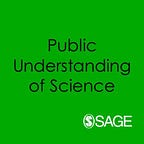Vaccine Hesitancy. New Pandemics, Old Politics
Review by Heidi J Larson
It is easier to blame the virus, or blame the public rather than recognise that government, scientific and health institutions need to reflect on how they can become more trustworthy.
Maya Goldenberg’s book fell on fertile ground in terms of its relevance to the current pandemic context, both specific to vaccines and beyond. Much of the book goes well beyond the vaccine hesitancy story and digs into broader issues of science and society, the politicisation of science, the “stubborn” mind, and the myth that expertise is dead.
Goldenberg situates vaccine questioning and reluctance in a broader discussion on trust or lack of trust, calling for a “reframing of vaccine hesitancy as a crisis of trust … in scientific institutions and governing agencies”. In short, the issues at hand are relational, not anti-science per se, but reflect distrust of the institutions that govern and interpret science. Particularly concerning, in terms of their trustworthiness, is the role these institutions play in mediating between the science and the public. Ay, therein lies the rub.
Goldenberg challenges the notion that vaccine hesitancy is a “war” on science, noting that “characterizing vaccine hesitancy and refusal as a war on science is both descriptively inaccurate and normatively unhelpful”. She adds that “the framing of vaccine hesitancy and refusal as a ‘war on science’ and a rejection of expertise…reduces the controversy to the status of vaccine science… These are concerns about justice and values rather than scientific knowledge”.
Interestingly, although challenging the “war on science”, Goldenberg doesn’t tackle the “war” metaphor often invoked in global health from the “fight” against infectious diseases and the “battle” against microbes — both against “invisible enemies” — to the “war on obesity”, among others.
In this case, the “war on science” suggests there is a war against science, with science being framed as the “enemy”, and some members of the public leading the “fight”, but this framing (and blaming) is given by the scientific and health community, feeling threatened by the questioning coming from the public, and blaming them from their lack of understanding.
In New Pandemics, Old Politics, anthropologist and human rights activist Alex de Waal challenges the “two hundred years of war on disease” framing, noting that “when we most need a narrative to make sense of a devastating pandemic, the ‘war’ on disease not only fails, but also stops us recognising our failures”.
Goldenberg also criticises the approach of placing the blame elsewhere, writing “what if focus shifted to building that trust rather than educating the misinformed publics or puzzling over their moral and epistemic failing”? She writes that “new mothers frequently report silencing and shaming when they attempt to raise concerns about childhood vaccinations with their healthcare providers”, a sentiment I too have heard among mothers, and write about in my book, Stuck, as one of our failings as a health community.
Goldenberg urges changing tactics, writing, “It is notable that the downfall of expertise in both past and present formulation is seen as a problem lying squarely with the publics, while science and its institutions require little or no scrutiny…it is a mistake that scientific institutions take little interest and responsibility for the well documented public trust”.
In short, it is easier to blame the virus, or blame the public rather than recognise that government, scientific and health institutions need to reflect on how they can become more trustworthy.
De Waal proposes a new more participatory framing, what he calls “emancipatory public health”. Although their entry points are different, both authors step back from the scientific facts and the content of policies and focus on the relationships around science and policies. De Waal proposes that “the starting point is not the content of the policies, but the process for getting to them. Those who are most vulnerable and most excluded will have some of the most important things to say”. Here again, the issue is relational. It is about building trust by being inclusive, especially involving those for whom the policies are meant.
In Vaccine Hesitancy, Goldenberg discusses the problematic “linear model” of science-to-policy, and she cites numerous critics of the model for “wrongly assuming that the right science leads to the right policy action”. She particularly points to a key problem with the model for which “the result is political paralysis, because the science gets politicized while the politics get scientized”.
De Waal’s related critique points to the missing piece of involving the most vulnerable and most excluded in the science-to-policy process, in a sense making it circular rather than linear — i.e. science-to-public-to-policy and circling back to the public who will then be more likely to embrace the science and policy, having participated in the process.
Both de Waal and Goldenberg call for approaches that will take time, which I also conclude in Stuck. De Waal’s point that “declaring a war is also declaring a state of emergency” is important to consider. Although the nature of pandemics and disease outbreaks, versus longer-term issues, lend themselves more to emergency mode, trust is rarely built in an emergency. Perhaps Goldenberg’s “crisis of trust” needs rethinking, at least as we move beyond the pandemic crisis to building trust throughout networks and relationships between science, government and scientific institutions, policymakers and publics.
On the other hand, every crisis is an opportunity to bring attention to an issue, and the bigger challenge will be to keep focused on the trust-building and trust-earning, as the crisis wanes. Goldenberg’s book, after all, was largely written before the pandemic, but it found a crisis to make its point.
Heidi J Larson is Professor of Anthropology, Risk and Decision Science and Director of The Vaccine Confidence Project at the London School of Hygiene & Tropical Medicine. Her most recent book is Stuck: How Vaccine Rumours Start — and Why They Don’t Go Away (Oxford University Press, 2021)
